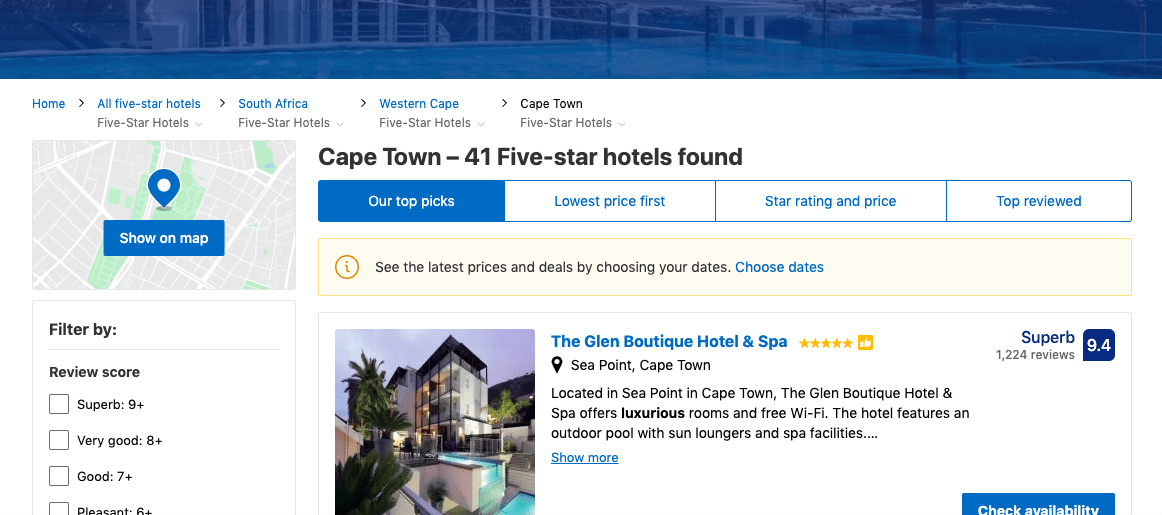Backlinks
What are Backlinks?
Backlinks are links from one website to a page on another website. Google and other major search engines consider backlinks “votes” for a specific page. Pages with a high number of backlinks tend to have high organic search engine rankings.
 For example, here is a link from booking.com for The Glen Boutique Hotel & Spa in Cape Town.
For example, here is a link from booking.com for The Glen Boutique Hotel & Spa in Cape Town.

Because that link points directly to their website, it’s a “backlink”.
Why Are Backlinks Important?
Backlinks are basically votes from other websites. Each of these votes tells search engines: “This content is valuable, credible and useful”. So the more of these “votes” you have, the higher your site will rank in Google and other search engines.
A study conducted found that links are Google’s key ranking signal, and Google has confirmed that backlinks remain one of their three most important search engine ranking factors.
What Types of Backlinks are Valuable?
If you want to rank higher, focus on high-quality backlinks. High-quality backlinks come from trusted, authoritative websites. This concept is known as “Domain Authority”. Essentially, the more authority a site has, the more authority it can pass on to your site (via a link). When a link comes from an authoritative site, Google puts lots of weight on it.
High-quality links are ones that include your target keyword in the link’s anchor text. As a reminder, anchor text is the visible text part of a link. In general, you want your links to have anchor text that includes your target keyword.
It can also be helpful to ensure that the site (and page) linking to you is topically related to your site. When a website links to another website, Google wants to see that the two sites are related.
Finally, it is worth ensuring that the link is from a domain that hasn’t linked to you before. Links from the same website have diminishing returns. Put another way, it’s usually better to get 100 links from 100 different websites than 1,000 links from the same website.
How to Build Backlinks
If you want people to link to your website, you need something on your site worth linking to, something also known as “Linkable Assets”. A Linkable Asset can be a blog post, a video, a piece of software, a quiz, a survey; anything that people will want to link to. In most cases, your linkable asset will be an amazing piece of content (which is why search engine optimization and content marketing are so closely tied together).
Another method is via link roundups. Link roundups are daily, weekly, or monthly blog posts that link to outstanding content. To be included in Link Roundups you’ll start by conducting research on what link roundups exist in your market. You can then politely suggest that they include your linkable asset in the roundup. If your post is a good fit for that person’s roundup, you’ll get a high-quality link, and potentially more exposure (on social media, for example).
Another method (sometimes called the ‘moving man’ method), is a process by which you seek to replace outdated links with your up-to-date content. First, you find web pages, resources, or businesses that are outdated, rebranded, or recently changed names. Then, find the sites that are still linking to these outdated resources. Finally, you email people to let them know that they’re linking to something that’s out of date and suggest your content as an up-to-date alternative.
You can also do this by identifying broken links (the Check My Links Chrome Extension is a cool resource to help with this). You then email the site owner about their dead link with, you guessed it, a suggestion for a working, updated, relevant link (yours).
There are many other methods you can use to get backlinks to your site, from guest posting, creating and promoting cool infographics, and submitting testimonials (with links to your website). You can offer your products to online bloggers. In line with Google’s Webmaster Guidelines, you cannot offer your product in exchange for a link of review, but we aren’t suggesting you do that- we are suggesting you strategically increase your audience and let your work speak for itself- send them the product and let them decide if it’s worth a mention on their blog.
Link building is critical for the success of your SEO strategy, so if you’re prepared to spend resources (time, money, etc.) on producing content, you should also be prepared to commit at least as much time to promoting and generating links to your content. Come back next week for part 5 in our SEO series.
If you’d like to find out if your business has an optimal SEO strategy, get in touch with one of our digital marketing consultants.

